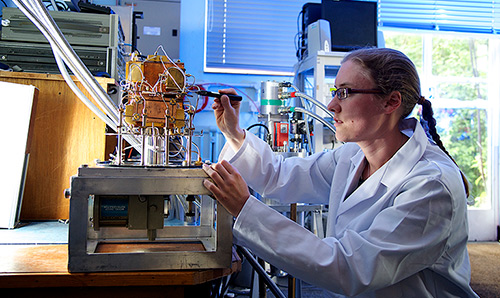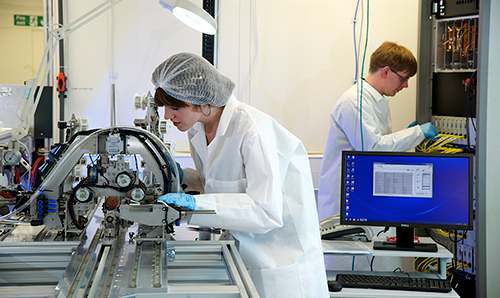Accelerator physics
Our research spans high-energy colliders and light sources to future compact accelerators, exploring applications in fundamental particle physics and cancer treatment, supported by participation in numerous large-scale international collaborations.
Academic staff
We have nine academic staff (and one honorary member), working with postdoctoral research associates and PhD students across various accelerator projects.
- Deepa Angal-Kalinin (Honorary Professor)
- Rob Appleby
- Oznur Apsimon
- Will Bertsche
- Stewart Boogert (Cockcroft Director)
- Darren Graham (Head of Group)
- Morgan Hibberd
- Roger Jones
- Mike Taylor (FBMH)
- Guoxing Xia
Particular research interests include:
- high-luminosity LHC upgrade
- laser- and proton-driven plasma wakefields
- terahertz acceleration and manipulation
- proton beam cancer treatment
- very high energy electron (VHEE) therapy
- anti-matter gravitation studies.
We are part of The Cockcroft Institute, the national centre for accelerator R&D based at Daresbury National Laboratory, home to the CLARA linear accelerator test facility, where we perform world-leading accelerator research.
We are closely linked with The Christie Hospital, which houses the first proton beam therapy centre in the UK, in addition to other research areas, such as particle, nuclear and photon physics, which includes the Dalton Nuclear Institute and Photon Science Institute.
If you are interested in joining our large group of postgraduate students (PhD and Masters) and postdoctoral researchers, we offer a number of fully-funded positions each year with world-class accelerator science training, travel to international conferences and opportunities to work abroad at large-scale facilities such as CERN, SLAC and ELI. To apply or find out more, please get in touch with our PGR coordinator Dr Morgan Hibberd (morgan.hibberd@manchester.ac.uk).
Key research areas
Our research is focused in three key areas:
Accelerator design and beam dynamics
We carry out detailed simulation work to understand and optimise accelerator performance, from cavity design to advanced beam dynamics. This includes:
- Large Hadron Collider, contributing to the design of optics, collimation and machine protection for the high-luminosity upgrade.
Novel accelerator techniques
We study new concepts to make more powerful accelerators, to push the boundaries of high-energy physics, while also reducing accelerator size and cost to make them more accessible. This includes:
- Plasma wakefields, driven by ultrashort laser pulses or particle beams, can provide accelerating gradients up to 1000x higher than conventional RF accelerators. For example, we are a key contributor to the Advanced Wakefield Experiment (AWAKE) at CERN.
- Terahertz accelerators, using laser-generated pulses of terahertz radiation for high-frequency acceleration and compression schemes, and streaking for bunch diagnostics. Our researchers are part of the THz Acceleration Group at The Cockcroft Institute.
Accelerator applications
We develop advanced accelerator technology to perform fundamental science research and for targeted industrial and medical applications. This includes:
- Anti-matter studies, exploring the production, properties and behaviour to explain its apparent absence in the Universe. We are part of the ALPHA experiment at CERN, investigating the influence of gravity on anti-matter.
- Radiation therapy, using precisely-targeted beams of high-energy protons and electrons for cancer treatment, reducing damage to surrounding healthy tissue.



